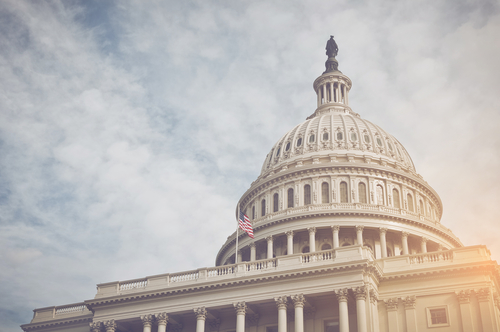
Members of the Senate Committee on Environment and Public Works agreed on the urgency of an infrastructure bill, while conceding a rapidly moving House version, slated for passage this week, stands no chance of being approved by the Senate.
During a full committee hearing held Wednesday morning, Sen. John Barrasso (R-WY) slammed the House bill, which was forwarded to the floor with no Republican votes, as a “road to nowhere.”
“There’s nothing bipartisan about it. It’s completely partisan,” said Barrasso, chairman of the Senate EPW Committee, of the House’s $1.5 trillion package.
Barrasso’s remarks came less than an hour after Senate Majority Leader Mitch McConnell (R-KY) said on the Senate floor he would not take up the House bill. McConnell scored the House package as a “thousand-page cousin of the Green New Deal, masquerading as a highway bill,” during his Wednesday remarks. The White House threatened to veto it if it were to be passed by both chambers.
The comments come as Sen. Sheldon Whitehouse (D-RI) called on Barrasso and other Senators to consider working with their House counterparts in a committee of Senate and House leaders to reconcile the separate versions of the bill, which until recent years has been the traditional method of the two chambers working out their differences. That method has since been abandoned, however, as the acrimony between Republicans and Democrats has heightened.
“This is not a left or right issue it’s really about moving forward,” said Sen. Corey Booker (D-NJ).
The Senate panel approved its version of an infrastructure bill a year ago that would provide $287 billion in funding for roads, bridges, and other projects and would also speed the approval process. The full Senate never voted on that bill. Sen. Shelly Moore Capito (R-WV) urged the full Senate to take up the bill passed by the committee a year ago, despite the Majority Leader’s threats about the House version.
Sen. Tom Carper (D-DE) noted the Senate’s bill, America’s Transportation Infrastructure Act (ATIA), does, for the first time, acknowledge the need to fund and approve infrastructure projects that are carbon neutral and that protect communities from climate change, signaling a major shift in thought for Republican lawmakers, many of whom have doubted the impact of climate change.
Christy Goldfuss, SVP of Energy and Environmental Policy for the Center for American Progress, told the panel the $10 billion Climate Change subtitle in Senate bill, the first-ever in a transportation bill, is a “notable step” in the right direction.
“The new provisions of ATIA, if sufficiently funded, would give state departments of transportation the tools and the incentives to recognize that their decisions have a major influence on the severity of climate change and our ability to withstand it,” she stated.
Goldfuss and the other members of a panel of experts told the Senate committee that the urgent need for infrastructure funding has accelerated significantly because of the COVID-19 pandemic, which has claimed tens of millions of jobs in the United States.
“In our view, there could be no better time to meaningfully address these deficiencies than at a moment when the economy is struggling from the fallout of COVID-19, millions of Americans—including particularly many low-wage workers—are out of work, and delayed income tax payments, decreased sales tax receipts, and massive, unanticipated health and public safety expenses have wrecked state and local government finances,” Jason Grumet, president of the Bipartisan Policy Center, said.
Robert Lanham, Jr., president of the board of the Associated General Contractors of America and of Williams Brothers Construction Co., said the shutdown of traffic all across the country due to the pandemic is starving states of critical highway usage fees and gas taxes.
“In many states, the declines in transportation revenues have already translated into real delays in undertaking new transportation projects,” Lanham said. “My greatest fear is that by the time a robust, multi-year surface transportation reauthorization bill becomes law, there will be far fewer construction contractors—many of whom are both my greatest competitors and dearest friend in business and even fewer construction workers employed to deliver transportation projects.”
Sen. Ben Cardin (D-MD) said the Senate needs to use the emergency of the pandemic to facilitate passage of an infrastructure bill.
“At the end of the day, it will not only create jobs, but it will create a better community for all people,” he said.